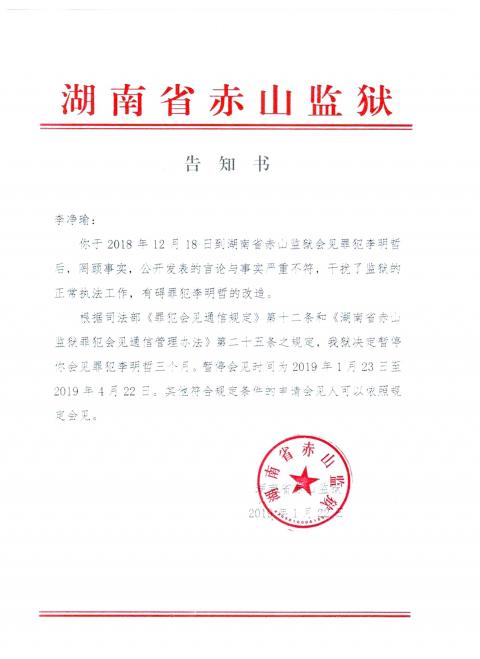Chinese prison authorities have barred Lee Ching-yu (李凈瑜) from visiting her husband, jailed human rights advocate Lee Ming-che (李明哲), for three months.
Lee Ming-che was in 2017 sentenced to five years for “subversion of state power.”
In a letter dated Tuesday last week, Chishan Prison in China’s Hunan Province said that after Lee Ching-yu visited her husband on Dec. 18, she made public comments that greatly deviated from the facts.

Photo courtesy of Taiwan Association for Human Rights
She interfered with the normal exercise of the prison’s law enforcement duties and hindered Lee Ming-che’s rehabilitation, it said.
Citing Chinese regulations, the prison said that Lee Ching-yu’s visitation rights would be suspended from Wednesday last week until April 22.
Other individuals who meet the prison’s conditions for visitation and apply to visit would be permitted, in line with the regulations, it added.
At a news conference in Taipei on Dec. 24, Lee Ching-yu said that her husband was being treated inhumanely at the prison.
Lee Ming-che was being forced to work more than 10 hours a day without any rest days, his warm clothing had been thrown out by prison officials, they served him spoiled food and his bank account had been frozen, Lee Ching-yu told reporters.
Her requests to visit her husband had been denied multiple times before she was finally allowed the visit in December.
Her most recent request to visit her husband was rejected, the Straits Exchange Foundation said on Friday.

A magnitude 4.9 earthquake struck off Tainan at 11:47am today, the Central Weather Administration (CWA) said. The hypocenter was 32.3km northeast of Tainan City Hall at a depth of 7.3km, CWA data showed. The intensity of the quake, which gauges the actual effect of a seismic event, measured 4 in Tainan and Chiayi County on Taiwan's seven-tier intensity scale, the data showed. The quake had an intensity of 3 in Chiayi City and County, and Yunlin County, while it was measured as 2 in Kaohsiung, Nantou County, Changhua County, Taitung County and offshore Penghu County, the data showed. There were no immediate reports of

Weather conditions across Taiwan are expected to remain stable today, but cloudy to rainy skies are expected from tomorrow onward due to increasing moisture in the atmosphere, according to the Central Weather Administration (CWA). Daytime highs today are expected to hit 25-27°C in western Taiwan and 22-24°C in the eastern counties of Yilan, Hualien, and Taitung, data on the CWA website indicated. After sunset, temperatures could drop to 16-17°C in most parts of Taiwan. For tomorrow, precipitation is likely in northern Taiwan as a cloud system moves in from China. Daytime temperatures are expected to hover around 25°C, the CWA said. Starting Monday, areas

A Taiwanese software developer has created a generative artificial intelligence (AI) model to help people use AI without exposing sensitive data, project head Huang Chung-hsiao (黃崇校) said yesterday. Huang, a 55-year-old coder leading a US-based team, said that concerns over data privacy and security in popular generative AIs such as ChatGPT and DeepSeek motivated him to develop a personal AI assistant named “Mei.” One of the biggest security flaws with cloud-based algorithms is that users are required to hand over personal information to access the service, giving developers the opportunity to mine user data, he said. For this reason, many government agencies and

Taiwan has recorded its first fatal case of Coxsackie B5 enterovirus in 10 years after a one-year-old boy from southern Taiwan died from complications early last month, the Centers for Disease Control (CDC) said yesterday. CDC spokesman Lo Yi-chun (羅一鈞) told a news conference that the child initially developed a fever and respiratory symptoms before experiencing seizures and loss of consciousness. The boy was diagnosed with acute encephalitis and admitted to intensive care, but his condition deteriorated rapidly, and he passed away on the sixth day of illness, Lo said. This also marks Taiwan’s third enterovirus-related death this year and the first severe